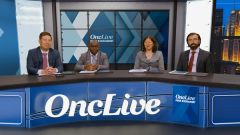
Dr. Petrylak on the Rationale of the EV-103 Trial in MIBC
Daniel P. Petrylak, MD, discusses the rationale for of the phase 1b/2 EV-103 trial in patients with muscle-invasive bladder cancer.
Episodes in this series

Daniel P. Petrylak, MD, professor of medicine and urology, coleader, Cancer Signaling Networks, Yale Cancer Center, discusses the rationale for of the phase 1b/2 EV-103 trial (NCT03288545) in patients with muscle-invasive bladder cancer (MIBC).
The EV-103 trial focused on patients with MIBC who were not eligible to receive cisplatin neoadjuvant chemotherapy, Petrylak says. Cisplatin-based chemotherapy is the current standard of care for those eligible in the patient population, and approximately one-third of those patients will achieve a pathological complete response, Petrylak adds. Cisplatin has been demonstrated to improve survival when compared with cystectomy alone in those with locally advanced muscle invasive disease, Petrylak explains.
The EV-103 study identified cisplatin-ineligible patients who predominately presented with poor renal function, Petrylak notes. They were administered enfortumab vedotin-ejfv (Padcev) for 3 cycles. Moreover, the cycles were adjusted so patients received the therapy on days 1 and 8, rather than days 1, 8, and 15, which is approved the approved regimen for metastatic patients, Petrylak concludes.































































